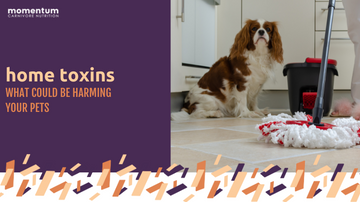As pet owners, we try to be as cautious as possible to not allow our little friends to get into things that may harm them- poisonous plants, tick-infested bushes, chocolate or grapes, and so on.
We also know the challenge in trying to mask the scent of dirty paws and wet dog fur. For some, the smell is just part of having a pet and that is something we (and guests!) will just have to live with. For others, the idea of having a smelly home is just not going to work. However, there may be some secret toxins in the cleaning products you use that may be harming your pet.
Read on to learn more about household toxins that could be harming your pet.
Cleaning Supplies
Most of us don’t think twice about the household cleaning supplies we use. As long as it gets the job done and smells decent, we’re good! Unfortunately, in houses with pets it is not that easy.
Even if you keep your pet in a separate room while actively using cleaning products, the residue and vapors that are left behind can still have toxic effects. The most common ingredients in household cleaning products that may be harmful to pets are bleach, ammonia, chlorine, alcohol, hydrogen peroxide, and chemicals that contain the “phenol” compound. A good indicator that your product may be dangerous is if it packs a powerful odor while promising immediate results. These common ingredients put pets at risk for the development of cancer, liver damage, kidney damage, and anemia.
To avoid putting your pet at risk, read the labels of cleaning products carefully to ensure you are using the safest product possible. In the event that you are using a product with a harmful chemical, such as ammonia or bleach, read the instructions thoroughly to determine how much you should use and if you can dilute it. Make sure you store the cleaning products in a locked cabinet or room where your pet cannot accidentally get into them.
Alternatively you could try the non-toxic Dr.Bronner's here.
Air Freshener Plugins
As we talked about in our Christmas with your Pets blog, the main harmful ingredient in most air fresheners are volatile organic compounds (VOCs). These organic chemicals have a high vapor pressure at room temperature, which allows them to easily turn into gas, or vapor, and dissipate into the air. VOCs can irritate your pet’s eyes, nose, and throat, can cause headaches, loss of coordination, lethargy, and nausea, and, in severe cases, can cause organ damage or cancer. It’s best not to use air fresheners in an enclosed space where you or your pet will be breathing in the air.
Another way that air fresheners can impact your pet is by falling onto surfaces that your pet will then walk or lay on. It may seem like the air fresheners completely disappear into the air, but if you’ve ever stood under a freshly-sprayed air freshener, you know that is simply not true. The product falls to the floor, or onto furniture, where your pet can then pick them up and feel the effects that way.
Candles and Essential Oil Diffusers
A common alternative to air fresheners is the use of candles and/or essential oil diffusers. While essential oils have a connotation of being all-natural and healthy, there can still be chemical compounds in the oils that are harmful to pets. It is always important to purchase essential oils from a brand that you trust, and read about the particular oils you are using before you use them. If you are still unsure, ask your veterinarian.
Brands that have a variety of safe essential oils include doTerra, Young Living, and Plant Therapy.
A few essential oils that are known toxins to dogs are:
- Cinnamon
- Citrus
- Peppermint
- Pine
- Tea tree
- Thyme
- Wintergreen
- Ylang ylang
Essential oils that are known toxins to cats are:
- Citrus
- Eucalyptus
- Lavender
- Peppermint
- Tea tree
- Thyme
- Wintergreen
- Ylang ylang
These lists are non-exhaustive, so always check with your veterinarian before using any essential oil in a home with pets.
Detergents
Laundry detergent is one of the most commonly used household cleaning products. We all need to wash our clothes, and most of us use generic detergent that we pick up at our local grocery store. But, let’s think about it. We use this small amount of thick liquid to clean a whole load of laundry. It must be pretty powerful stuff to be able to clean that much fabric in one wash.
The color and scents of laundry detergent are attractive to pets. When spilled, it is not uncommon for pets to think it could be a tasty treat. Ingestion of laundry detergent can cause poisoning and a whole host of health issues for your pet. Even if your pet does not lick the detergent from the bottle or from a spill, there is still a trace amount that is left on their bedding after it has been washed, so the risk is still present.
To clean your pet’s bedding or clothing, use all-natural laundry detergent that does not contain any harsh chemicals. Alternatively, you can try washing your pet’s things without laundry detergent and find all-natural and safe alternatives. If you are unsure what good substitutions might be, check with your veterinarian. They know the safest ways to care for your pet while keeping them clean and happy.
Overall, there are an abundance of toxins that could be in your home, harming your pet. While you do not need to go and get rid of every cleaning product you have, it could be useful to go through your products and make informed decisions about when and where you will use them that will be the safest for you and your pet. Always consult with a veterinarian if you are unsure about any product or chemical.

